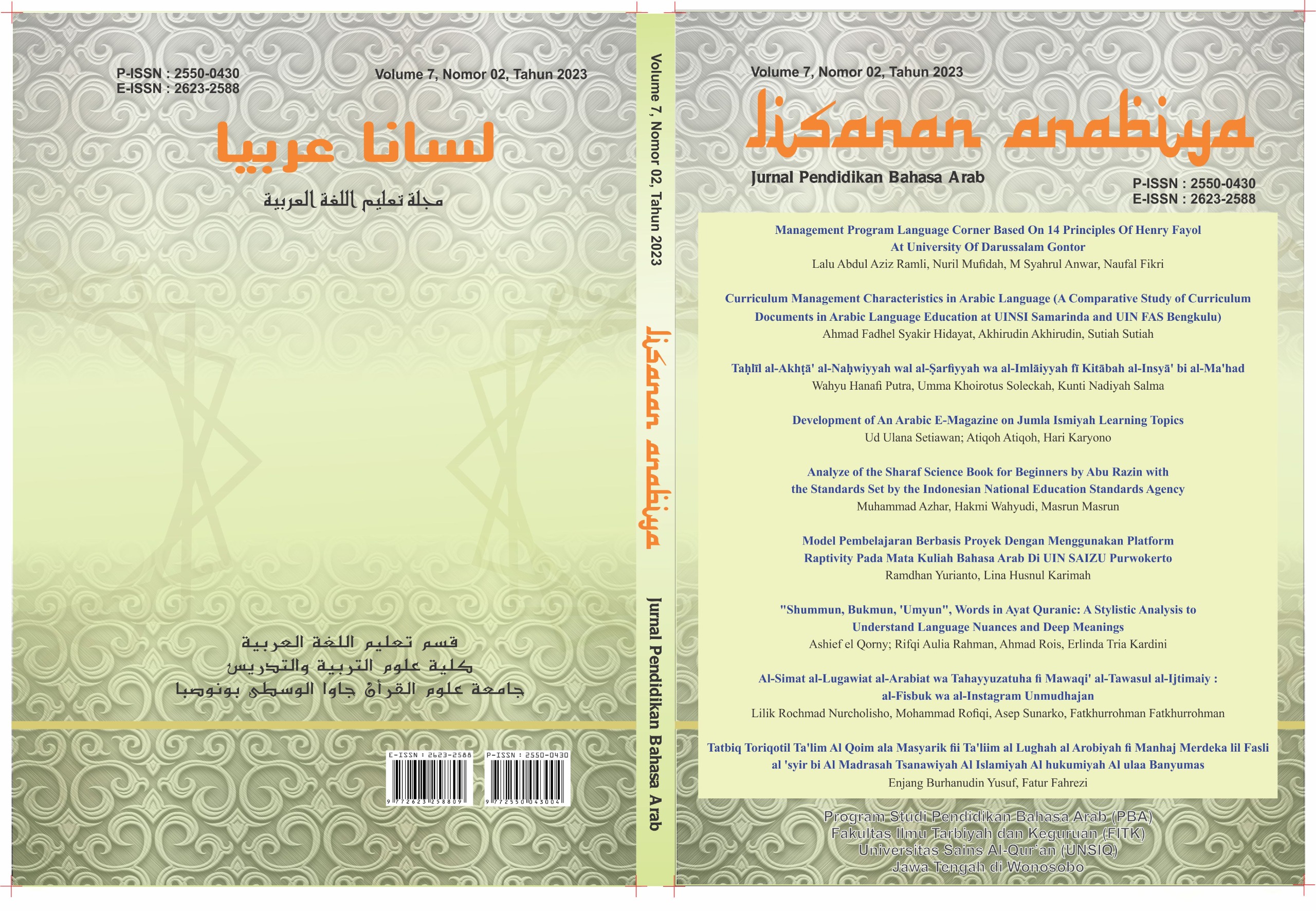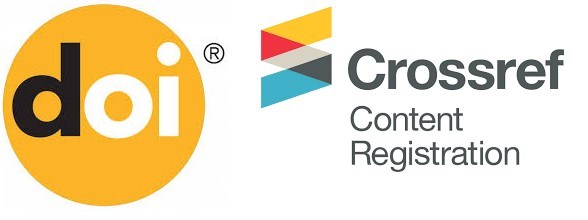Enhancing Language Corner Management with Henry Fayol’s Principles at Darussalam Gontor University
DOI:
https://doi.org/10.32699/liar.v7i2.5201Keywords:
Management, Program, Henry Fayol, Fourteen PrinciplesAbstract
The purpose of this study to describe the program of management Languge Corner based on fourteen managements principles of Henry Fayol in the form (Division of Work, Authority and Responsibility, Discipline, Unity of Command, Unity of Direction, Subordination of Individual Interests, Payroll, Centralization, Scalar Chains, Order, Justice, Stability, Initiative, Spirit of Unity). The research approach used in this study is a qualitative descriptive approach with a case study type. The research subjects were at the Educational Institute of Darussalam Gontor University, Ponorogo. Techniques of data collection were collected through observation of Langugage Corner program management and interviews with heads of Arabic language teaching programs and students as well and administrative documentation. Data analysis included data display, data reduction and drawing conclusions. The results showed that the management of the Language corner program at Darussalam Gontor University had used fourteen management principles from Henry Fayol. Each indicator of management principle was included of category highly implemented which means that these fourteen management principles had been implemented in the language corner program. at Darussalam Gontor University. The four of these principles are: prioritizing organizational interests over individual interests, fair compensation, centralization and scalar chain are included in applied criteria.
References
Ahyani, H., Abduloh, A. Y., & Tobroni, T. (2021). PRINSIP-PRINSIP DASAR MANAJEMEN PENDIDIKAN ISLAM DALAM AL-QUR’AN. Jurnal Isema : Islamic Educational Management, 6(1), Article 1. https://doi.org/10.15575/isema.v6i1.10148
Carhuapoma García, K. (2018). Programa de Estrategias Administrativas sustentada en la teoría de Henry Fayol y Chesterd Barnard para mejorar la Organización Educativa y Desempeño Docente en la Institución Educativa n° 14380, Caserío San Lázaro, Pacaipampa, Ayabaca. Año 2014. http://repositorio.unprg.edu.pe/handle/20.500.12893/6171
Diana, D., & Misran, M. (2021). PERAN KOMUNIKASI DALAM MANAJEMEN PENDIDIKAN. Kelola: Journal of Islamic Education Management, 6(1), Article 1. https://doi.org/10.24256/kelola.v6i1.1828
Didi, D. S. (2020). Manajemen Pendidikan Tinggi Islam (Upaya Mereposisi dan Merekonstruksi Lembaga Pendidikan Tinggi Islam di Era Globalisasi). Southeast Asian Journal of Islamic Education Management, 1(2), Article 2. https://doi.org/10.21154/sajiem.v1i2.23
Djuroto, T. (2000). Manajemen penerbitan pers. Remaja Rosdakarya.
Fattah;, N. (2009). Landasan Manajemen Pendidikan / Nanang Fattah (Bandung). Remaja Rosdakarya. //senayan.iain-palangkaraya.ac.id/index.php?p=show_detail&id=4946&keywords=
Ginting, R., Purwati, E., Arumsari, N., Pujiastuti, N. S., Kussanti, D. P., Falimu, Muhaimin, Dani, J. A., Syaifullah, J., Suryani, I., Nurcandrani, P. S., Wardhana, A., Mayratih, S., Wijayanti, C. N., & Sari, A. A. (2021). Manajemen Komunikasi Digital Terkini. Penerbit Insania.
Hussai̇n, N., Haque, A. U., & Baloch, A. (2019). Management Theories: The Contribution of Contemporary Management Theorists in Tackling Contemporary Management Challenges. Yaşar Üniversitesi E-Dergisi, 14, 156–169. https://doi.org/10.19168/jyasar.635061
Ismiani, S. (2021). IMPLEMENTASI PRINSIP-PRINSIP MANAJEMEN PENDIDIKAN ISLAM DALAM HOMESCHOOLING DI TENGAH PANDEMI COVID-19. At-Tadbir : Jurnal Manajemen Pendidikan Islam, 1(1), Article 1. https://doi.org/10.51700/attadbir.v1i01.124
Julianto, B., & Agnanditiya Carnarez, T. Y. (2021). FAKTOR-FAKTOR YANG MEMPENGARUHI ORGANISASI PROFESSIONAL: KEPEMIMPINAN, KOMUNIKASI EFEKTIF, KINERJA, DAN EFEKTIVITAS ORGANISASI (SUATU KAJIAN STUDI LITERATURE REVIEW ILMU MANAJEMEN TERAPAN). Jurnal Ilmu Manajemen Terapan, 2(5), 676–691. https://doi.org/10.31933/jimt.v2i5.592
Kartika, A. (2017). POLA KOMUNIKASI KEPEMIMPINAN KEPALA MADRASAH. Jurnal Isema : Islamic Educational Management, 2(1), Article 1. https://doi.org/10.15575/isema.v2i1.4997
Kurniawati, E., Arafat, Y., & Puspita, Y. (2020). Peran Kepemimpinan Kepala Sekolah dalam Meningkatkan Mutu Pendidikan melalui Manajemen Berbasis Sekolah. Journal of Education Research, 1(2), Article 2. https://doi.org/10.37985/joe.v1i2.12
Mbalamula, Y. S., Suru, M. H., & Seni, A. J. (2017). Utility of Henri Fayol’s fourteen principles in the administration process of secondary schools in Tanzania. International Journal of Education and Research, 5(6), 103–116.
Moleong, L. J. (2007). Metodologi penelitian kualitatif edisi revisi.
M.T, P. D. H. U., M. Pd. (2022). Manajemen: Teori, Praktik, dan Riset Pendidikan Edisi 4. Bumi Aksara.
Pujiman, P., Rukayah, R., & Matsuri, M. (2021). Penerapan prinsip manajemen kelas dan pengaruhnya terhadap motivasi belajar siswa di sekolah dasar. JPI (Jurnal Pendidikan Indonesia): Jurnal Ilmiah Pendidikan, 7(2), Article 2. https://doi.org/10.20961/jpi.v7i1.47616
Rabiah, S. (2019). MANAJEMEN PENDIDIKAN TINGGI DALAM MENINGKATKAN MUTU PENDIDIKAN. Jurnal Sinar Manajemen, 6(1), Article 1. https://doi.org/10.56338/jsm.v6i1.551
Rahman, M. H. (2012). Henry Fayol and Frederick Winslow Taylor’s Contribution to Management Thought: An Overview. ABC Journal of Advanced Research, 1(2), Article 2. https://doi.org/10.18034/abcjar.v1i2.10
Rahman, R. A., Huda, M., Astina, C., & Faida, F. (2022). Adaptasi Kurikulum Merdeka Belajar Mata Pelajaran Bahasa Arab di SMP Takhassus Al-Qur’an Wonosobo. Lisanan Arabiya: Jurnal Pendidikan Bahasa Arab, 6(2), 265–284. https://doi.org/10.32699/liar.v6i2.3707
Rama, A., Giatman, M., Maksum, H., & Dermawan, A. (2023). Konsep Fungsi dan Prinsip Manajemen Pendidikan. Jurnal EDUCATIO: Jurnal Pendidikan Indonesia, 8(2), 130. https://doi.org/10.29210/1202222519
Rohman, A. (2018). Dasar-dasar manajemen publik.
Rosdiarini, R. (2020). IMPLEMENTASI PRINSIP-PRINSIP MANAJEMEN PENDIDIKAN ISLAM: STUDI KASUS MADRASAH IBTIDAIYAH “AL-MUKMININ” KALANGAN, JOMBANG. Nidhomul Haq : Jurnal Manajemen Pendidikan Islam, 5(1), Article 1. https://doi.org/10.31538/ndh.v5i1.464
Sahputra, D. (2020). Manajemen Komunikasi Suatu Pendekatan Komunikasi. JURNAL SIMBOLIKA Research and Learning in Communication Study, 6(2), Article 2. https://doi.org/10.31289/simbollika.v6i2.4069
Sellang, K., & Darman, M. (2017a). PENERAPAN PRINSIP-PRINSIP MANAJEMEN DALAM KEPEMIMPINAN DI SEKOLAH TINGGI ILMU SOSIAL DAN ILMU POLITIK MUHAMMADIYAH RAPPANG KABUPATEN SIDENRENG RAPPANG PROVINSI SULAWESI SELATAN. AkMen JURNAL ILMIAH, 14(3), Article 3. https://e-jurnal.nobel.ac.id/index.php/akmen/article/view/84
Sellang, K., & Darman, M. (2017b). PENERAPAN PRINSIP-PRINSIP MANAJEMEN DALAM KEPEMIMPINAN DI SEKOLAH TINGGI ILMU SOSIAL DAN ILMU POLITIK MUHAMMADIYAH RAPPANG KABUPATEN SIDENRENG RAPPANG PROVINSI SULAWESI SELATAN. AkMen JURNAL ILMIAH, 14(3), Article 3. https://e-jurnal.nobel.ac.id/index.php/akmen/article/view/84
Siregar, F. A., & Usriyah, L. (2021). Peranan Komunikasi Organisasi dalam Manajemen Konflik. Idarah (Jurnal Pendidikan Dan Kependidikan), 5(2), Article 2. https://doi.org/10.47766/idarah.v5i2.147
Sola, E. (2022). PRINSIP-PRINSIP MANAJEMEN VS KINERJA GURU: SEBUAH TINJAUAN UMUM. Educational Leadership: Jurnal Manajemen Pendidikan, 1(2), Article 2. https://doi.org/10.24252/edu.v1i2.26602
Suryadarma, Y., & Ridho, A. M. A. (2023). Analisis Tingkat Kepuasan Pembelajaran Bahasa Arab bagi Peserta PKU Unida Gontor Tahun 2022. Shibghoh: Prosiding Ilmu Kependidikan UNIDA Gontor, 1, 115–125.
Suwatah, S. (2017). Prinsip-prinsip manajemen Islam. EDUSIANA: Jurnal Manajemen dan Pendidikan Islam, 4(1), Article 1.
Tahir, A. (2014). Buku ajar perilaku organisasi. Yogyakarta: Deepublish.
Wijaya, C., & Rifa’i, M. (2016). Dasar-dasar manajemen: Mengoptimalkan pengelolaan organisasi secara efektif dan efisien.
Downloads
Published
Issue
Section
License
Authors who publish with this journal agree to the following terms:
a. Authors retain copyright and grant the journal right of first publication with the work simultaneously licensed under a Creative Commons Attribution-ShareAlike 4.0 International License. that allows others to share the work with an acknowledgement of the work's authorship and initial publication in this journal.
b. Authors are able to enter into separate, additional contractual arrangements for the non-exclusive distribution of the journal's published version of the work (e.g., post it to an institutional repository or publish it in a book), with an acknowledgement of its initial publication in this journal.
c. Authors are permitted and encouraged to post their work online (e.g., in institutional repositories or on their website) prior to and during the submission process, as it can lead to productive exchanges, as well as earlier and greater citation of published work (See The Effect of Open Access).












